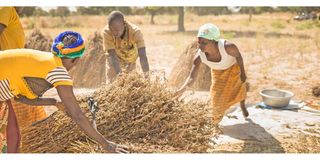Prime
Why sesame is increasingly becoming a lucrative business in Tanzania

What you need to know:
- The crop has attracted better prices at between Sh 3,655 and Sh 4000 a kilo, compared to the Sh800 per kilo that it fetched at some point in previous years
Mtwara. Sesame farmers have all the reasons to smile after fetching higher prices in the ongoing 2022/23 trading season.
Over 21,000 tonnes of the produce have been sold so far, generating nearly Sh80 billion for farmers in Lind and Mtwara regions.
Reports from sesame-growing regions show that the crop has been traded at a maximum price of over Sh4,000 and a minimum price of Sh3,665 per kilo.
Lindi Mwambo Cooperative Union (LMCU) and Ruangwa, Nachingwea and Liwale Cooperative Union (Runali) have jointly sold over 10,881 tonnes worth nearly Sh40 billion.
Over 10,200 tonnes of the produce have been sold by members of Masasi and Mtwara Cooperative Union (Mamcu), garnering over Sh40 billion for farmers.
LMCU general manager Nurudin Said says more than 21 companies have participated in the initial auctions, mostly from China, where the crop’s demand is increasingly high.
"Farmers should continue growing the crop through best cultivation practices in order to get high and quality yields that will guarantee better prices,” he says.
Lindi Region produces the Lindi Sesame White 2002 variety, which was developed by the Tanzania Agricultural Research Institute (Tari) at the Naliendele Centre.
According to the LMCU official, the variety is characterised by a high oil content, which is preferred on the international market.
Mamcu general manager Biadia Matipa says more than 10,216 tonnes of the produce worth over Sh40 billion had been sold in the initial auctions.
Matipa says 5,000 tonnes of the produce were traded in the first auction, while another 3600 tonnes and 1,216 tonnes were sold respectively in the second and third public sales.
“More than Sh22 billion generated from the first auction has already been paid to the farmers in the region,” she says.
Runali general manager Jahida Hassan says a total of 710.6 tonnes of sesame have been traded at a maximum price of Sh3,810 and a minimum of Sh3,807 per kilo, respectively.
"Most farmers have been celebrating the offered prices. Generally, the region forecasts increased yields as compared to previous years,” he says.
“The increase in yields is attributed to farmers’ understanding of the proper use of agriculture inputs,” she adds, saying the cooperative forecasts to harvest over 25,000 tonnes this season.
A sesame farmer, Mr Salum Mnyeto from Mnolela Agricultural Marketing Cooperative Society (Amcos), says increased education has led to a significant rise in crop yield.
"Most farmers have received capacity building training on the proper use of fertilisers and pesticides, therefore improving crop production, as well as yields,” he shares.
“The government and other regulatory authorities should consider lowering the price of inputs in order to increase fertiliser uptake and efficiently control pests and diseases,” he observes.
A farmer from Zingamiguruwe Ward in Kilwa District, Lindi Region, Yahaya Kikoleka, shares that the availability of agricultural inputs is a major concern.
“Whenever they are available, higher prices remain a stumbling block for the majority of farmers, as most of them can’t afford them. Pest and disease control is a practise that is highly recommended for farmers to record high crop yields,” Kikoleka says.
"Higher prices of agricultural inputs have prohibited most farmers from engaging in sesame farming, therefore increasing the demand for the government’s intervention to ensure the materials are available at affordable prices,” the farmer adds.

He opines that Tari-Naliendele researchers should also carry out studies that will enable farmers to come up with pesticides that will increase efficiency in managing pests and sesame diseases.
Sesame's national coordinator, Joseph Nzunda, says the crop has been instrumental in generating income among farmers and the government in general.
"The most important thing is for farmers to use better seeds, especially sesame white, which is in high demand in different foreign markets due to its oil content,” he says.
Nzunda says researchers and agriculture experts have motivated and educated sesame farmers on the best cultivation methods, therefore enabling them to produce quality produce, which is preferred by domestic and foreign customers.
"There was a time farmers sold the produce at Sh800 per kilo, but these efforts have attracted better prices that are now benefiting individual farmers and the country at large,” he says, adding, “Lindi white 2002 seeds are produced in large quantities by Tari Naliendele. Farmers should secure the seeds and start growing them on their farms in order to reap financial and nutritional benefits.”
According to Nzunda, the variety has been improved to enable farmers to get better yields and higher prices.
“The variety gives good results within 100 days. Also, the variety can be grown in different parts of the country, which is an added advantage for Tanzanians wishing to engage in the production of the crop,” the expert says.
The crop can be grown at an altitude of 1,000 meters with 400–800 millimeters of humidity, and it can also be produced during summer through irrigation.
Tabling the 2023/24 budget in Parliament, Agriculture minister Hussein Bashe said the country has been recording an increase in sesame exports and revenue generation.
Mr Bashe, who is the Nzega Urban Constituency Member of Parliament (MP), said 114,920 tonnes of sesame were produced in the 2020 season, generating $111.79 million.
He told Parliament that 110,701 and 120,987 tonnes of the produce were exported in the 2021 and 2022 seasons, generating $123 million and $143.79 million, respectively.
He said variations have been recorded in sesame seed production in the last five years.
According to him, the amount of tproduce in tonnes and respective years of production in brackets are: 133,704 (2017/18); 227,821 (2018/19); 228,920 (2019/20); 236,162 (2020/21); and 79,170 (2021/22).
“In the 2023/24 season, Tari is planning to produce 50,000 tonnes of qualified seeds. It will also produce 15 tonnes of primary seeds that will have the ability to produce 3,000 tonnes of qualified seeds,” the minister said.
“During this period, Tari plans to train farmers on the best production methods of sesame through 150 demonstration farms located in Manyara, Morogoro, Dodoma, Lindi, Mtwara, Songwe and Katavi regions,” he added.




